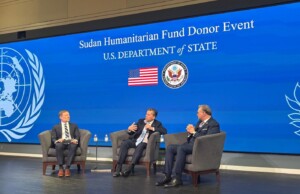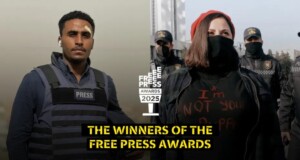Sit-in against Sudan’s Information Law
Members of the Resistance Committees active in El Diyoum El Shargiya neighbourhood in the Sudan capital of Khartoum organised a protest vigil in front of the Information Crimes Court yesterday to condemn harsher penalties in the Information and Cybercrime Law. Chief Justice Nemat Abdallah has instructed the protection of witnesses prepared to testify about violence used against protestors in the December revolution.
 Members of the Resistance Committees active in El Diyoum El Shargiya neighbourhood in the Sudan capital of Khartoum organised a protest vigil in front of the Information Crimes Court yesterday (Social media)
Members of the Resistance Committees active in El Diyoum El Shargiya neighbourhood in the Sudan capital of Khartoum organised a protest vigil in front of the Information Crimes Court yesterday (Social media)
Members of the Resistance Committees active in El Diyoum El Shargiya neighbourhood in the Sudan capital of Khartoum organised a protest vigil in front of the Information Crimes Court yesterday to condemn harsher penalties in the Information and Cybercrime Law. Chief Justice Nemat Abdallah has instructed the protection of witnesses prepared to testify about violence used against protestors in the December revolution.
A number of members of Resistance Committees are on trial after a complaint by an officer that they posted a report on social media accusing the officer of corruption.
According to the activists, the prosecutor was reluctant to follow up the procedures.
They said in a statement that the Information and Cybercrime Law was developed by the former regime to silence opposition voices. “It targets revolutionaries with the aim to prevent the opening of corruption files.”
The Resistance Committees call for amending the law, including the punishments, as the law provides for a prison sentence ranging from four to six years in addition to heavy fines.
As reported by Radio Dabanga yesterday, the Port Sudan prosecutor has arrested journalist Osman Hashim on charges related to ‘information crimes’. Hashim was later released on bail.
Activists told Radio Dabanga that one of the former governors filed a complaint against Hashim. who frequently contributes to Radio Dabanga, about posts on his Facebook page about alleged corruption that occurred during the former governor’s rule.
They clarified that the former governor concerned is facing trial in Red Sea state in several cases of corruption.
Witness protection
Chief Justice Nemat Abdallah has instructed the protection of witnesses prepared to testify about violence used against protestors in the December revolution.
Sara Omar, leading member of the Resistance Committees Coordination of Khartoum East, said in a press conference at the Sudan News Agency yesterday that coordinators of the Resistance Committees in Khartoum have handed Justice Abdallah a memorandum calling for the issuance of a judicial circular for the protection of the witnesses, including testifying hidden from the public.

They expressed their concerns about the reluctance of witnesses to testify due to their being threatened.
Omar explained that the Chief Justice had informed them that she ordered the head of the judiciary to prevent the regular forces from attending the trials, except for the judicial police. In addition, necessary measures must be taken to protect witnesses, including special procedures for entering the court.
The reason for their request for witness protection is that a witness in a case against a major of the Rapid Support Forces accused of killing activist Hanafi Abdelshakour, was threatened.
“A large number of officers of the various regular forces attended the court session while the judge asked about the witness’s personal data publicly, in addition to the surreptitious filming of a member of the regular forces,” she said.
“Most of the witnesses are young and inexperienced revolutionaries, and the accused are members of the regular forces.”
She said that threatening witnesses leads to their failure to testify, and that their testimony in open sessions and taking their statements may expose them to danger and confuse their testimony.
Radio Dabanga’s editorial independence means that we can continue to provide factual updates about political developments to Sudanese and international actors, educate people about how to avoid outbreaks of infectious diseases, and provide a window to the world for those in all corners of Sudan. Support Radio Dabanga for as little as €2.50, the equivalent of a cup of coffee.












 and then
and then